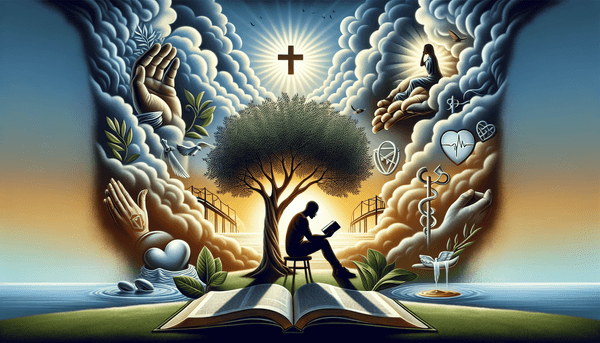The Omniscience of God
One of the most awe-inspiring attributes of God, as revealed in the Bible, is His omniscience, the ability to know everything, including the future. Isaiah 46:10 declares, 'I make known the end from the beginning, from ancient times, what is still to come. I say, My purpose will stand, and I will do all that I please.' This scripture offers a profound understanding of God's sovereignty over time and events. God's foreknowledge comforts believers, knowing that nothing escapes His gaze, as seen in the Psalms, 'You have searched me, LORD, and you know me. You know when I sit and when I rise; you perceive my thoughts from afar.' (Psalm 139:1-4). Yet, it also presents a challenge to trust in a plan far beyond our understanding, as we are reminded in Romans 8:28, 'And we know that in all things God works for the good of those who love him, who have been called according to his purpose.'
Encountering God
The moment of meeting God is often envisioned as one of great awe and reverence. The Bible speaks to this encounter, suggesting a transformational experience where 'They will see his face, and his name will be on their foreheads.' (Revelation 22:4). This encounter with the Divine is a moment believers await with hope and joy, as it promises the revelation of God's fullness and the experience of His unconditional love and grace. In times of reflection, we are reminded of the Apostle Paul's words in 1 Corinthians 13:12, 'Now we see only a reflection as in a mirror; then we shall see face to face.' The anticipation of this direct and clear understanding of God's nature is a central hope of the Christian faith.
Human Beings in God's Likeness
At the heart of the biblical narrative is the declaration that human beings are created in the image and likeness of God. Genesis 1:26-27 states, 'Then God said, 'Let us make mankind in our image, in our likeness...' So God created mankind in his own image, in the image of God he created them; male and female he created them.' This foundational truth carries profound implications for our understanding of human dignity and the sanctity of life. It also entrusts us with the responsibility to rule and steward creation thoughtfully and wisely, as reflected in the majesty of Psalm 8: 'You have made them a little lower than the angels and crowned them with glory and honor.' (Psalm 8:5).
Reconciling with the Legacy of the Inquisitions
The inquisitions remain a dark chapter in human history, marked by religious persecution and violence. As we reflect on this period, the Bible calls us to a higher standard of love, mercy, and forgiveness. Jesus taught, 'You have heard that it was said, 'Love your neighbor and hate your enemy.' But I tell you, love your enemies and pray for those who persecute you' (Matthew 5:43-44). The journey towards healing and reconciliation requires acknowledging past atrocities, seeking forgiveness, and a firm commitment to justice. This path is not easy, but it is illuminated by scriptures such as 2 Chronicles 7:14, which invites us to humble ourselves, pray, seek God's face, and turn from our wicked ways, promising healing for our lands.
Conclusion
As we conclude our reflections, we are reminded of the enduring relevance of Scripture in offering wisdom and guidance for life's most profound challenges. From contemplating God's omniscience to preparing for the momentous encounter with the Divine, and from grappling with our identity as God's image-bearers to seeking reconciliation for historical wrongs, the Bible provides a framework for understanding and action. Let us walk with humility, embracing the love and justice that Scripture advocates, allowing God's word to guide our steps and illuminate our paths, drawing us ever closer to the heart of God and the fullness of His grace.
FAQ
Q: Does God know the future?
A: Yes, according to the Bible, God knows the future. In Isaiah 46:10, it is written, 'I make known the end from the beginning, from ancient times, what is still to come. I say, My purpose will stand, and I will do all that I please.' This verse illustrates God's omniscience and sovereignty over all time and events.
Q: What is going to happen when we meet God?
A: When we meet God, it will be a moment of awe and reverence. In the Bible, it is written in Revelation 22:4, 'They will see his face, and his name will be on their foreheads.' It will be a time when all things will be made clear, and we will experience the fullness of God's love and grace.
Q: Where does God say we are made in His likeness?
A: God reveals that we are made in His image in the opening chapter of Genesis. Genesis 1:26-27 states, 'Then God said, 'Let us make mankind in our image, in our likeness...' So God created mankind in his own image, in the image of God he created them; male and female he created them.'
Q: How can we reconcile the inquisitions?
A: The Bible calls for reconciliation and repentance. It is important to acknowledge the mistakes and atrocities of the past, seek forgiveness from those who have been harmed, and work towards healing and reconciliation. This is achieved through love, mercy, and a commitment to justice, as Jesus says in Matthew 5:43-44, 'But I tell you, love your enemies and pray for those who persecute you.'






